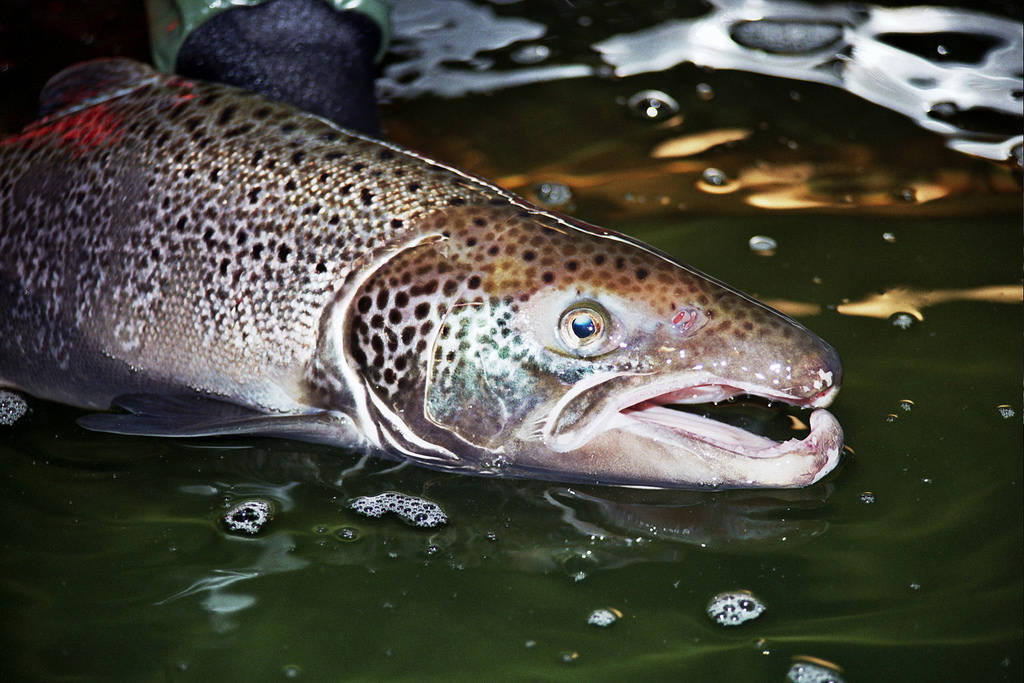The Lummi Nation has declared a state of emergency after thousands of non-native salmon were accidentally released into the Salish Sea.
An unknown quantity of Atlantic salmon poured into waters off the shore of Cypress Island when an approximately 30-year-old net pen collapsed on Sunday, Aug. 20. The fish farm, which was showing signs of damage on Saturday, held 305,000 salmon, according to the farm’s owner Cooke Aquaculture. The company purchased salmon farms located on Bainbridge Island, Cypress, Port Angeles and Hope Island a year ago.
“The tribe has not received confirmation that the Atlantic salmon spill has been contained, so we have to assume that the invasive fish continues to spill into these waters, putting the spawning grounds for native salmon species at risk,” said Timothy Ballew II, chairman of the Lummi Indian Business Council in a press release. “Lummi is encouraging its tribal fishermen to continue fishing the waters through the weekend in efforts to remove as many Atlantic salmon as possible. Tribal fishermen are currently fishing within Bellingham Bay and at the mouth of the Nooksack River to protect and help prevent native fish of the area from being eaten or exposed to disease. The Atlantic salmon spill must be addressed immediately by all levels of government.”
Cooke Aquaculture blamed the damage done to the net pens on “exceptionally high tides and currents,” in relation to Monday, Aug. 21’s solar eclipse. However, preliminary tidal data from National Oceanic and Atmospheric Administration’s Friday Harbor station indicated that the high tide was no higher than it has been in recent weeks (see https://goo.gl/pKcFZs).
According to CBC News, the facility, “required emergency work to stabilize the net pens after crews saw them moving in currents,” and Cooke Aquaculture was waiting for permits to be approved.
On Tuesday, Aug. 22, Washington Department of Fish and Wildlife issued a press release encouraging the public to capture the Atlantic salmon with no size or quantity limitations.
“Our first concern, of course, is to protect native fish species,” said Ron Warren, head of WDFW’s Fish Program, in a press release. “So we’d like to see as many of these escaped fish caught as possible.”
According to Warren, there is no evidence that the salmon are a threat to native fish populations.
A technical memorandum issued by NOAA in September 2001 said that between 1996 and 1999, more than 600,000 Atlantic salmon escaped net pens in Washington state waters in a variety of net pen events WDFW called “catastrophic.” According to NOAA, only 2,500 of those escaped salmon were accounted for, leading researchers to conclude that the rest of the fish likely became prey to native predators like seals, sea lions and bigger fish and did not successfully reproduce.
According to WDFW, there were no significant escapes of Atlantic salmon reported in the state prior to 1996. During the summer of 1996, 107,000 Atlantic salmon escaped a net pen when an anchor line failed. A year later, approximately 369,000 fish escaped while a pen was being towed to avoid a toxic algae bloom. Then, in June 1999, an “extreme tidal exchange” caused a net pen to fail, resulting in 115,000 escaped salmon.
“I worry most about the potential for them to transmit disease to native salmon and about the potential for these animals to establish themselves in the region,” said SeaDoc Society Science Director Joe Gaydos. “I think WDFWs open season is a good first step to try and reduce the number of released salmon … After the 1996 Atlantic salmon [escape] on Cypress Island, fish were found as far north as the Salmon River on Vancouver Island. So these fish are likely to travel widely.”
Gaydos is also skeptical of the fish farm’s explanation for the accidental release.
“This (excuse) is disappointing and sound irresponsible. The eclipse and associated high tides were not a surprise – they’ve been predicted for a long time,” said Gaydos. “I would have hoped that the facility would have planned for and prevented this.”
State Senator Kevin Ranker, D-Orcas, said he is having his staff research the current regulations for net pen facilities in the state. The Washington Department of Ecology was in the process of reviewing the more than 30-year-old net pen regulations when the failure occurred.
“Given the state of our wild salmon we should be applying much stricter scrutiny on operations like this – not less,” said Ranker. “We should question whether these facilities should be permissible at all in Washington state.”
Washington is the only west coast state that currently has active commercial net pen salmon farms. Alaska and California have banned the practice and though not prohibited, there are none in operation in Oregon.
“It’s a totally unacceptable situation that was preventable, and I’m doing everything in my power to make sure it never happens again,” said Ranker. “I will very likely be introducing legislation trying to address this in the future.”



